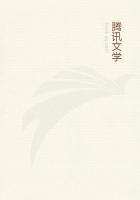Similarly in the case of motion: two things are of the same velocity if they occupy an equal time in accomplishing a certain equal amount of motion. Suppose, then, that in a certain time an alteration is undergone by one half of a body's length and a locomotion is accomplished the other half: can be say that in this case the alteration is equal to the locomotion and of the same velocity? That would be absurd, and the reason is that there are different species of motion. And if in consequence of this we must say that two things are of equal velocity if they accomplish locomotion over an equal distance in an equal time, we have to admit the equality of a straight line and a circumference. What, then, is the reason of this? Is it that locomotion is a genus or that line is a genus? (We may leave the time out of account, since that is one and the same.) If the lines are specifically different, the locomotions also differ specifically from one another: for locomotion is specifically differentiated according to the specific differentiation of that over which it takes place. (It is also similarly differentiated, it would seem, accordingly as the instrument of the locomotion is different: thus if feet are the instrument, it is walking, if wings it is flying; but perhaps we should rather say that this is not so, and that in this case the differences in the locomotion are merely differences of posture in that which is in motion.) We may say, therefore, that things are of equal velocity in an equal time they traverse the same magnitude: and when I call it 'the same' I mean that it contains no specific difference and therefore no difference in the motion that takes place over it. So we have now to consider how motion is differentiated: and this discussion serves to show that the genus is not a unity but contains a plurality latent in it and distinct from it, and that in the case of equivocal terms sometimes the different senses in which they are used are far removed from one another, while sometimes there is a certain likeness between them, and sometimes again they are nearly related either generically or analogically, with the result that they seem not to be equivocal though they really are.
When, then, is there a difference of species? Is an attribute specifically different if the subject is different while the attribute is the same, or must the attribute itself be different as well? And how are we to define the limits of a species? What will enable us to decide that particular instances of whiteness or sweetness are the same or different? Is it enough that it appears different in one subject from what appears in another? Or must there be no sameness at all? And further, where alteration is in question, how is one alteration to be of equal velocity with another? One person may be cured quickly and another slowly, and cures may also be simultaneous: so that, recovery of health being an alteration, we have here alterations of equal velocity, since each alteration occupies an equal time. But what alteration? We cannot here speak of an 'equal' alteration: what corresponds in the category of quality to equality in the category of quantity is 'likeness'. However, let us say that there is equal velocity where the same change is accomplished in an equal time. Are we, then, to find the commensurability in the subject of the affection or in the affection itself? In the case that we have just been considering it is the fact that health is one and the same that enables us to arrive at the conclusion that the one alteration is neither more nor less than the other, but that both are alike. If on the other hand the affection is different in the two cases, e.g. when the alterations take the form of becoming white and becoming healthy respectively, here there is no sameness or equality or likeness inasmuch as the difference in the affections at once makes the alterations specifically different, and there is no unity of alteration any more than there would be unity of locomotion under like conditions. So we must find out how many species there are of alteration and of locomotion respectively. Now if the things that are in motion-that is to say, the things to which the motions belong essentially and not accidentally-differ specifically, then their respective motions will also differ specifically: if on the other hand they differ generically or numerically, the motions also will differ generically or numerically as the case may be. But there still remains the question whether, supposing that two alterations are of equal velocity, we ought to look for this equality in the sameness (or likeness) of the affections, or in the things altered, to see e.g. whether a certain quantity of each has become white. Or ought we not rather to look for it in both? That is to say, the alterations are the same or different according as the affections are the same or different, while they are equal or unequal according as the things altered are equal or unequal.
And now we must consider the same question in the case of becoming and perishing: how is one becoming of equal velocity with another?
They are of equal velocity if in an equal time there are produced two things that are the same and specifically inseparable, e.g. two men (not merely generically inseparable as e.g. two animals).
Similarly one is quicker than the other if in an equal time the product is different in the two cases. I state it thus because we have no pair of terms that will convey this 'difference' in the way in which unlikeness is conveyed. If we adopt the theory that it is number that constitutes being, we may indeed speak of a 'greater number' and a 'lesser number' within the same species, but there is no common term that will include both relations, nor are there terms to express each of them separately in the same way as we indicate a higher degree or preponderance of an affection by 'more', of a quantity by 'greater.'















